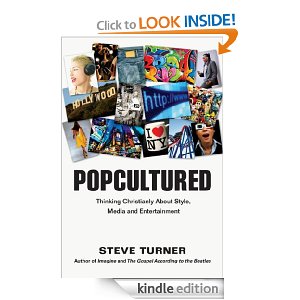“Art washes away from the soul the dust of everyday life”– Picasso
Whether we know it or not, and whether we like it or not, we swim in a cultural soup, a consumer cultural soup. One of the strength’s of Steve Turner’s book ‘Popcultured’ is in demonstrating just how pervasive the effect of pop culture is on everything from our values to the way we dress, what we listen to and watch, and what we eat. One of the main reasons a Christian should not stick his head in the sand and think that pop culture is too superficial to be concerned about is that if we wish to share the Gospel with others who live in the same cultural ethos, then we need to know not only what is important to them, but what shapes their thoughts and feelings about life in general and the faith in particular.
For example, if you are dealing with a big fan of ‘South Park’ (or even some episodes of the Simpsons) be prepared for stereotypes of Christians as boring, up-tight, hypocritical, intolerant, judgmental and the like. As Turner reminds us, a 2010 survey showed that Americans on average spend 11.5 hours a week listening to music, 7.9 hours watching TV, 4.4 hours social networking, 3 hours reading magazines, and 2.8 hours a week playing video games. I would venture to guess that the distribution of these allotments would differ if we just looked at the 18-30 age bracket. Regardless, we neglect the effect of pop culture on both the churched and the non-churched at our peril.
Turner is furthermore right that popular culture, and more specifically what is popular tells us a good deal of how our contemporaries are thinking (p. 23). Turner adds “Even people who announce that they hate God will pronounce truths because its impossible for anyone to operate on 100 percent lies. We’re free to disagree with God, but we’re not free to live outside his universe.”
One of the ways Turner demonstrates not just the pervasiveness of pop culture but its influence is by pointing out what happens to people when they are stripped of their favorite cultural elements— their clothes, their music, their books, etc. This is of course what the Nazis did in concentration camps and it was dehumanizing. What that tell us is that to be truly human, we must express ourselves culturally (see p. 48). The question is— what sort of culture? Even the Amish have a culture— its just an anachronistic German agricultural culture with strong Christian values. As Turner says “God entrusts culture to us– the ability to create it, enjoy it, and critique it. The faithful servant does all three.” (p. 56). We are to be in the world without being ‘of’ it— but what exactly does this mean? It certainly doesn’t mean we are called to be killjoys for Jesus, or simply have an allergic reaction to all of popular culture, rather we must develop an acumen for sifting the wheat from the chaff.
Of course there is something to be said for the fact that in a fallen world with lots of wickedness in play, one of the values of popular culture is that it can take our mind off of some things that we need to not dwell on as Christians (p. 133). Pop culture can be a fruitful diversion in an otherwise very serious world.
Finally, I found some of Turner’s analysis of the Biblical material quite insightful. For instance, consider what he says about laughter– “The Bible speaks of laughter is four different ways. There is the laughter of sheer joy. When people who love each other gather there is laughter. Good news produces smiles. There is the laughter of disbelief. When Abraham is told that his hundred year old wife is about to get pregnant, he laughs [actually the story stresses it was Sarah in the main who offered a laugh of disbelief]…Then there is the laughter of scorn. Jeering, sneering, and mocking involve laughter. Finally there is the laughter produced by incongruity. Humans behaving like gods are always laughable. God is portrayed laughing in the Psalms at the ridiculous idea that humans think they can take him in and win. We too laugh when people act as Masters of the Universe and then slip of a banana peel.” (p. 145).
“Popcultured’ is not a perfect book, or even a must read book like Andy Crouch’s book on Culture-Making, but it is in various ways a good, insightful, and useful book full of important information if we are to understand the world we live in, and what motivates, drives and influences those we hope to lead to Christ.














